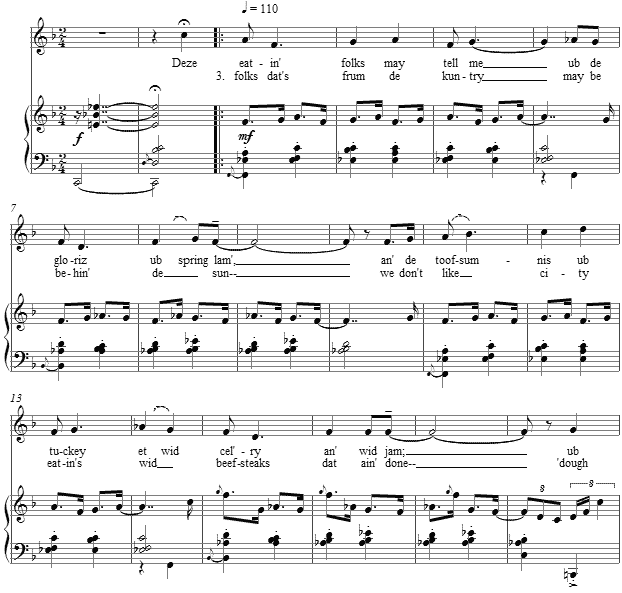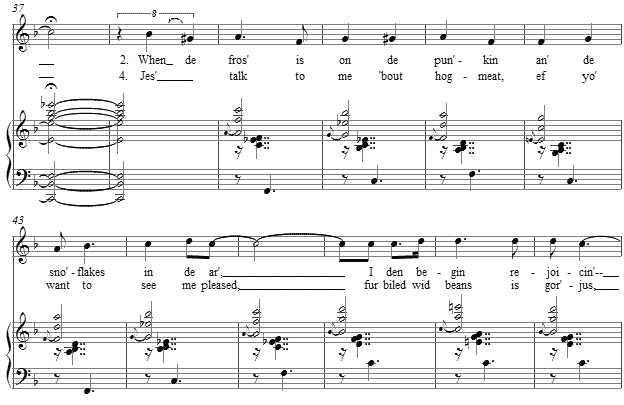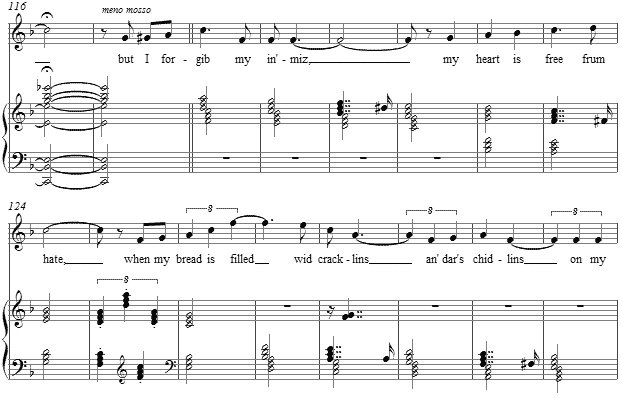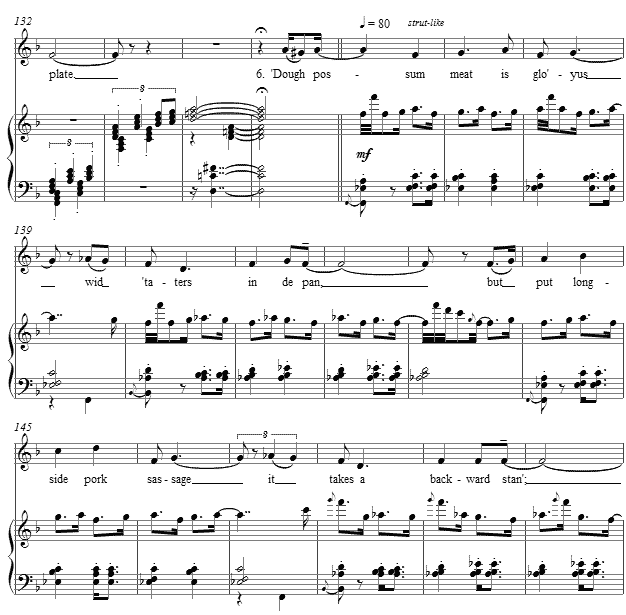Music and Texts of GARY BACHLUND
Vocal Music | Piano | Organ | Chamber Music | Orchestral | Articles and Commentary | Poems and Stories | Miscellany | FAQs
Hog Meat - (2007)
Daniel Webster Davis
for medium high voice and piano
Deze eatin' folks may tell me ub de gloriz ub spring lam',
An' de toofsumnis ub tuckey et wid cel'ry an' wid jam;
Ub beef-st'ak fried wid unyuns, an' sezoned up so fine--
But you' jes' kin gimme hog-meat, an' I'm happy all de time.
When de fros' is on de pun'kin an' de sno'-flakes in de ar',
I den begin rejoicin'--hog-killin' time is near;
An' de vizhuns ub de fucher den fill my nightly dreams,
Fur de time is fas' a-comin' fur de 'lishus pork an' beans.
We folks dat's frum de kuntry may be behin' de sun--
We don't like city eatin's, wid beefsteaks dat ain' done--
'Dough mutton chops is splendid, an' dem veal cutlits fine,
To me 'tain't like a sphar-rib, or gret big chunk ub chine.
Jes' talk to me 'bout hog-meat, ef yo' want to see me pleased,
Fur biled wid beans tiz gor'jus, or made in hog-head cheese;
An' I could jes' be happy, 'dout money, cloze or house,
Wid plenty yurz an' pig feet made in ol'-fashun "souse."
I 'fess I'm only humun, I hab my joys an' cares--
Sum days de clouds hang hebby, sum days de skies ar' fair;
But I forgib my in'miz, my heart is free frum hate,
When my bread is filled wid cracklins an' dar's chidlins on my plate.
'Dough 'possum meat is glo'yus wid 'taters in de pan,
But put 'longside pork sassage it takes a backward stan';
Ub all yer fancy eatin's, jes gib to me fur mine
Sum souse or pork or chidlins, sum sphar-rib, or de chine.[ 7 pages, circa 4' 40" ]
Daniel Webster Davis
Daniel Webster Davis (1862-1913) was an educator, Baptist minister, popular, orator, historian, poet and a leader of Richmond Virginia's African-American community for over three decades. The following, delightfully quaint biographical sketch is taken from Twentieth Century Negro Literature Or, A Cyclopedia of Thought on the Vital Topics Relating to the American Negro, edited by D. W. Culp, A. M., M. D., 1902, J. L. Nichols & Company, Naperville, Illinois.
Randall and Charlotte Davis, who were valued servants on a Caroline County farm, found themselves, March 25, 1862, the parents of a little black boy, who brought gladness and sorrow to their hearts. Gladness, because the Lord had sent them a boy, and he was their boy, bone of their bone, flesh of their flesh, blood of their blood. Sorrow, because, while he was their child, he was "Marster's" child too; he belonged to "Marster" more than he did to them.
War was raging. The Negro cabins knew little else but muffled prayers, stifled songs, unuttered sermons—all for deliverance. From the cabin to the broad fields of tobacco these emotions and utterances were carried daily. Father preached, mother prayed. Singing was but the opening of the oppressed heart. Those were troublous years, heart-aching years. Years of consecration, fixed and unceasing, to the God of Freedom. In such an atmosphere the boy was nurtured and reared.
The war was over. The boy over whom mother and father had prayed had changed from a chattel, a thing of barter, to a free child, belonging only to mother and father. What a change!
Entering the public schools of Richmond, step by step, grade by grade was passed with honor and public commendation, until June, 1878, when D. Webster Davis graduated from the Richmond High and Normal School, receiving at the same time the Essayist Medal.
In 1880 the subject of our sketch commenced to teach in the public schools of Richmond and has taught therein continuously ever since, and is to-day rated as one of the best and most progressive in the system.
September 8, 1893, Mr. Davis married Miss Lizzie Smith, a teacher in the Richmond public schools. From this happy union three children have been born.
In October, 1895, feeling that the time had come for him to be about his Father's business he was ordained to the ministry.
From a child he babbled in verse, and the poetic muse brought in 1896, "Idle Moments" and in 1898, "Weh Down Souf." These two books established the name of Rev. Mr. Davis as a poet and have given him front rank with his contemporaries in verse-making.
Guadaloupe College, Seguin, Texas, recognizing the meritorious work of Rev. Davis bestowed upon him the degree of A. M. in 1898.
Rev. Mr. Davis is at present pastor of the Second Baptist Church of Manchester, where he has an ideal growing church of young folks, which work he began in 1895.
In the winter of 1900, the Central Lyceum Bureau of Rochester, N. Y., engaged the services of Rev. Davis for a four-weeks' reading tour, reading selections from his own works. The whole tour was an ovation, showing that texture of hair and color of skin cannot destroy that aristocracy of intellect, that charmed inner circle wherein "a man is a man for a' that."
The Lord has been good to Rev. Daniel Webster Davis, blessing him with intellectual force, blessing him with poetic utterance, blessing him with oratorical ability, blessing him in domestic felicity. Not yet in his prime, yet so richly endowed in the gifts which make men strong and powerful, it is hoped that he may be spared many years to work in the Master's vineyard, and many years to labor for the uplift of his race, oppressed and downtrodden.
May he expand and grow greater, remembering that he is God's servant, endowed for the benefit of his race, blessed, so that he may bless his people made strong, so that he may reach down and lift his people up, growing brighter and better unto the present day.
Written for medium high voice, the setting is in an "American" style. The text may be found in The Book of American Negro Poetry. Ed. James Weldon Johnson. New York: Harcourt, Brace and Company, 1922. The poem's verses are at first kept synchronous with the "verses" of the setting, stanzas 1 and 3 set to the first style, and stanzas 2 and 4 to a second contrasting style.
As the poet has chosen to write in a slang of American English, I enclose below for those whose first language is not English a translation as assistance. [ 1 ]
The second style is far less "music hall" and direct, as the season is greeted directly -- "hog-killin' time is near."
As the fourth stanza is broken in half architecturally in the setting, another musical change accompanies the next mood change. There comes a relative peace alongside the excitement of "hog-killin' time" as the speaker finds peace from the mere contemplation of the many varieties of "hog meat" soon to come.
The sixth stanza becomes "strut-like" and more enthusiastic, as the litany of other meats and their accompanying dressings are contrasted to this glorious time and season. The utter charm of this text is in its use of a lower class or slang parlance to sing the praises of meats -- something lower classes were not always fortunate enough to enjoy. It is in this way a sign of advancement and even emancipation for the American black in the time in which this and other fine texts were written. [ 2 ]
The score for Hog Meat is available as a free PDF download, though any major commercial performance or recording of the work is prohibited without prior arrangement with the composer. Click on the graphic below for this piano-vocal score.
NOTES
[ 1 ] What follows is an far less artistic rendition of Davis' text, as assistance to those who would find at first his parlance difficult. To make this translation shows how wonderfully artistic and interesting is Davis' capture of a parlance now generally gone from the overall American tapestry of English language dialects. I apologize herein for robbing from Davis' text as a help to others who do not at first feel comfortable with this distinctly American dialect.
These eating folks may tell me of the glories of spring lamb,
And the toothsome-ness of turkey eaten with wild celery and with jam;
Of beef steak fried with onions, and seasoned so fine --
But you just can give me hog meat, and I am happy all the time.
When the frost is on the pumpkin and the snowflakes in the air,
I then begin rejoicing -- hog killing time is near;
And the visions of the future then fill my nightly dreams,
For the time is fast coming for delicious pork and beans.
We folks that are from the country may be behind the sun -- [backwards]
We do not like city eating, with beef steak that is not done --
Though mutton chops are splendid, and those veal cutlets fine,
To me it is not like a spare rib, or a great big chunk of shin.
Just talk to me about hog meat, if you want to see me pleased,
For boiled with beans it is gorgeous, or made into hog's head cheese;
And I could just be happy, without money, clothes or house,
With plenty of years and pigs' feet made in an old-fashioned sauce.
I confess I am only human, I have my joys and cares --
Some days the clouds hang heavy, some days the skies are fair;
But I forgive my enemies, my heart is free from hate,
When my bread is filled with cracklings and there is chitterlings on my plate.
Though opossum meat is glorious with potatoes in the pan,
But put alongside pork sausage it takes a backward stance;
Of all your fancy eating, just give to me for mine
Some sauce or pork or chitterlings, some spare rib, or the shin.
Chitterlings (chit´linz, and sometimes pronounced with three rather than the preferred two syllables) is not a well-known word even to many English speakers. Webster's New World Dictionary defines the word as "the small intestines of pigs, used for food, usually fried in deep fat."
A delightful little quote says, "We were well along in years before we discovered that the name of this dish had an "e," an "r," a "g" -- and 3 syllables, and still farther along before we found these were the base for the sausage, Andouillette, the French set store by. Just after slaughtering, empty the intestines of a young pig while still warm, by turning them inside out and scraping the mucous covering off completely." [p. 512, Joy of Cooking, Irma Rombauer and Marion Rombauer Becker (1975 edition). 1931, Bobbs-Merrill Company, Indianapolis, New York.] For further instructions on preparation, I leave it to the interested to find the recipe noted above in its entirety.
[ 2 ] Professor W. H. Crogman, chair of Greek and Latin in Clark University, Atlanta, wrote in the Introduction to Twentieth Century Negro Literature, "The first generation of Negroes after emancipation exhibited to a painful degree the spirit of dependence, an inclination to lean on something and on somebody—now on the politician, now on the philanthropist. The reason for this, of course, is not far to fetch. The spirit of dependence is invariably a characteristic of weakness."
It is a tragic commentary on the continuing nostalgia for socialist theory and thinking that a "spirit of independence" is not further encouraged, but rather a "spirit of dependence, an inclination to lean on something and on somebody" which the modern white-led Left tries to instill in American black culture today, as if the aspirations of the movement captured in the life work of Martin Luther King have become corrupted by an elite seeking wealth at the expense of the greater community's independence, twisting it back into dependence which American history visited upon earlier generations of blacks. May this be corrected as authors like Culp, Davis and Crogman have so clearly expressed above, with further emancipation, pride in culture and independence of spirit which is evolving still.




